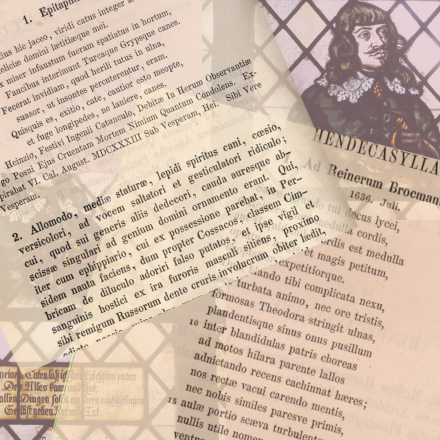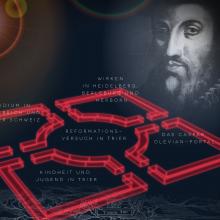Paul Fleming
Complete edition of the Latin and German works of Paul Fleming with translation of the Latin works as well as commentary and indexes to the complete works

Project Management: PD Dr. Beate Hintzen (Rheinische Friedrich-Wilhelms-Universität Bonn) · Prof. Dr. Gernot Michael Müller (Rheinische Friedrich-Wilhelms-Universität Bonn) · Rheinische Friedrich-Wilhelms-Universität Bonn · Prof. Dr. Dirk Werle (Ruprecht-Karls-Universität Heidelberg) · Ruprecht-Karls-Universität Heidelberg · Dr Thomas Burch (Universität Trier - Trier Center for Digital Humanities (TCDH)) · Universität Trier - Trier Center for Digital Humanities (TCDH)
Project Participants: Universitäts- und Landesbibliothek Bonn (ULB)
Sponsors: Deutsche Forschungsgemeinschaft (DFG)
Running time: -
Contact person (TCDH): Dr Thomas Burch; Dr Claudia Bamberg
References:
Beate Hintzen: Paul Fleming, in: St. Arend u.a. (Hgg.): Frühe Neuzeit in Deutschland 1620–1720. Literaturwissenschaftliches Verfasserlexikon, Bd. 3, Sp. 44-66., Berlin und Boston, 2021.
Gernot Michael Müller: Die „Germania generalis“ des Conrad Celtis. Studien mit Edition, Übersetzung und Kommentar, Tübingen 2001 (Frühe Neuzeit 67).
Dirk Werle: „Barocke“ Lyrik lesen, Frankfurt a.M. 2019.
Burch, Thomas (zus. mit Claudia Bamberg): Inventarisieren, Analysieren und Archivieren vernetzt. Digitalisierung und Edition größerer Briefkorpora mit der virtuellen Editionsplattform »Forschungsnetzwerk und Datenbanksystem (FuD)«. In: Hanna Delf von Wolzogen, Rainer Falk (Hgg.): Fontanes Briefe ediert. Würzburg: Königshausen & Neumann 2014, S. 265–282.
Research Area: Software Systems and Research Infrastructure, Digital Literary and Cultural Studies, Digital Edition and Lexicography
Keywords: 17th century, Hybrid Edition
Important representative of early baroque poetry receives a digital edition of his works
It is planned to create a hybrid of a book and a digital edition based on the single-source publishing principle, which optimally corresponds to the character of Paul Fleming's œuvre. Fleming is an author central to European literary, intellectual, and cultural history. His texts reflect the literary, artistic, scientific, and confessional discourses and spheres of life typical of the 17th century in an exemplary breadth rarely found in his environment: Trained as a physician, he is considered the most important representative of early Baroque poetry and literary neo-Stoicism. He absorbed and continued not only various ancient traditions but also contemporary poetic currents, making him the central figure of the Central German poetic network and the most important protagonist of German Petrarchism.
The son of a Protestant pastor, Fleming integrated central aspects of Lutheranism into his poetry, but was equally oriented toward Jesuit devotional piety. He thus continued the plurality of Latin poetic traditions, but at the same time consistently implemented Opitz's reform of German poetry. In addition, Fleming decisively developed the German ode and, in some cases, produced intermedial, musico-literary entities with his German-language poems. Fleming was also a participant in a trading expedition to Russia and Persia that lasted several years, and he recorded his extraordinary experiences of the foreign in poetic form.
Important impulses for the cultural, medical, and geographic history of the early modern period expected
The intended edition is considered one of the most urgent desiderata of early modern Germanist and Latinist research, since Fleming's work has so far only been accessible in an edition from the 19th century that is in great need of revision. Due to the diversity and cultural relevance of Fleming's poetry, the edition will also provide important impulses for the cultural, medical, and geographic history of the early modern period.
Although the digitization of Fleming's complete works is already an important first step, only a critical edition can provide the necessary mediation that does justice to the complexity of the historically significant texts. The aim is to bring together the complete works in a clear way and to contextualize their history of creation and transmission. In addition, a translation of the Latin poetry should greatly facilitate access to the work, especially since Fleming's language is characterized by a departure from classicist ideals and ambiguous readings.
Detailed and structured work program
The edition, translation, and annotation of early modern texts is an extremely time-consuming undertaking. The eight-year time frame envisaged for the proposed project will be realized through professional project management, interlocking processes, and carried out according to this specification:
- Edition
- Translation
- Commentary
- Overall structure
- Use of the virtual research environment “FuD” to collect data from the beginning of the project
Data model and usability concept for the online edition developed at TCDH
In the course of the interdisciplinary work of all participants (edition scientists, computer scientists, and web designers), the virtual research environment "Research Network and Database System" FuD will be modified to meet the project-specific requirements and the design and usability concept will be developed. The FuD data model for recording the relationships between German and Latin texts will be configured by the TCDH, the recording of comments will also be prepared here, and interfaces for exporting the data (JSON and TEI/XML) will be set up. All data recorded in FuD can thus be exported as TEI-compliant XML data. The goal is to release a first beta version after 36 months of project runtime.
For long-term storage of the data after completion of the project, TCDH provides an export of all database contents in the form of TEI-compliant XML data together with METS/MODS-based encodings of the metadata. These data will be archived long-term by the ULB Bonn via the RADAR research data repository developed in a DFG project for at least 15 years.
Bildnachweis: Paul-Gerhardt-Kirche in Lübben; Farbglasfenster mit Bildnis des Kirchenlieddichters Paul Fleming (1609–1640) sowie CAMENA. Lateinische Texte der Frühen Neuzeit der Universität Mannheim, im XML-Format verfügbar (https://www2.uni-mannheim.de/mateo/camena/AUTBIO/fleming.html)
Team TCDH
Dr Claudia Bamberg
E-mail: bamberg uni-trier [dot] de
uni-trier [dot] de
Phone: +49 651 201-3790
Dr Matthias Bremm
E-mail: bremm uni-trier [dot] de
uni-trier [dot] de
Phone: +49 651 201-4733
Dr Thomas Burch
E-mail: burch uni-trier [dot] de
uni-trier [dot] de
Phone: +49 651 201-3364
Michael Lambertz
E-mail: lambertz uni-trier [dot] de
uni-trier [dot] de
Phone: +49 651 201-3226
Sandra Weyand
E-mail: weyands uni-trier [dot] de
uni-trier [dot] de
Phone: +49 651 201-3161










